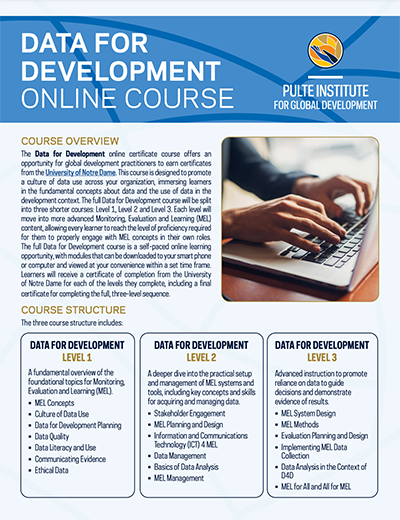
The University of Notre Dame has celebrated the completion of its first online certificate designed to promote a culture of data use across development organizations. The Data for Development course — developed by the Keough School of Global Affairs’ Pulte Institute for Global Development — enrolled a total of 202 learners split into four cohorts between January and May. The first course ended in July of this year, with 69 Chemonics employees passing.
Initially created for long-standing Pulte Institute partner Chemonics International, the course immersed the organization’s learners in the fundamental concepts about data and the use of data in the development context. The three-level course is designed to meet learners where they are physically, culturally, and professionally while still considering the personalized needs of each learner. The downloadable modules are accessible anywhere at any time and include various levels of Monitoring, Evaluation and Learning (MEL) content that allow professionals to reach the required level of proficiency needed for their specific roles.
Designed and led by the Pulte Institute’s evidence and learning director, Paul Perrin, the course brings together an impressive instructional team with decades of hands-on experience in quantitative and qualitative research methods, field research design, and statistical analyses across multiple sectors.
“Effective development requires that programs are regularly monitored and evaluated using proper data practices and this requires full buy-in across an organization,” said Perrin, who is also a Keough School Associate Professor of the Practice. “By making this foundational knowledge accessible to those staff who often have fewer training opportunities, we are able to build the capacity of local actors and, ultimately, help to improve their ability to make impactful social change.”
Creating an accessible, global learning environment
Developing a virtual course that brings together a culturally, professionally, and globally diverse set of learners is a considerable challenge. The university engaged Everspring Inc., a leading provider of education technology, to create a custom online learning platform that uses asynchronous content, message boards, and mobile accessibility to connect learners across several countries and time zones on their educational journey.
Four Ukrainian citizens were enrolled in the course and, despite their unfortunate geopolitical circumstances throughout the Spring, one has passed and three are due to complete the course in November. This is a testament to the course’s flexible, self-paced nature and emphasis on adapting to the needs of each learner.
“While the development space is usually very diverse, especially in an organization like Chemonics, there are often challenges related to equity and inclusion between field staff and US staff. Because of this, we wanted to make sure that we were empowering each and every one of our learners to fully engage in the course,” said Edward Jurkovic, a program manager with the Pulte Institute. “Diversity, Equity, and Inclusion were at the forefront of our planning conversations and, as a result, half of our subject matter experts originate from outside the United States, a majority come from ethnic minorities, and all are highly proficient in at least one language other than English.”
The longevity and modularity of the content, coupled with the diversity of course authors, has given the university a model for creating a more relatable, continuous education experience for a wide variety of learners.
“We believe that continuous education has the power to change the world, which is why we seek to help individuals and communities thrive as knowledge accelerates, and society and work changes,” said Camille Rudge, director of continuing education in the Provost’s Office. “The Data for Development project is a leading example of how the university can bring the richness of its Academy to a multitude of learners across the globe.”
The team plans to use the Data for Development program to create three, one credit courses for the Keough School’s Masters of Global Affairs program. Other development organizations have also expressed interest in similar certificates.
More information about the course can be found online here. If you are interested in creating a custom MEL course for your organization, please contact Pulte Institute Executive Director Michael Sweikar.